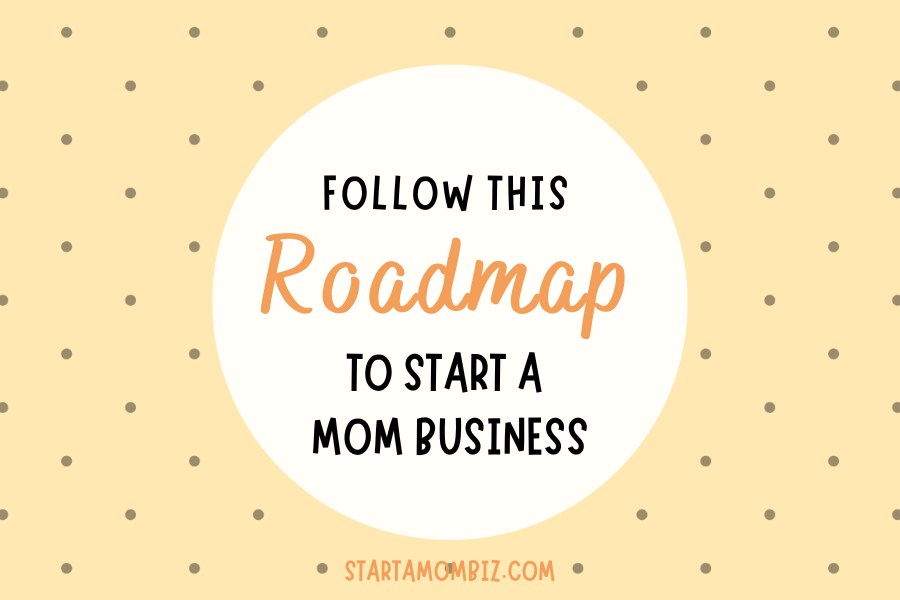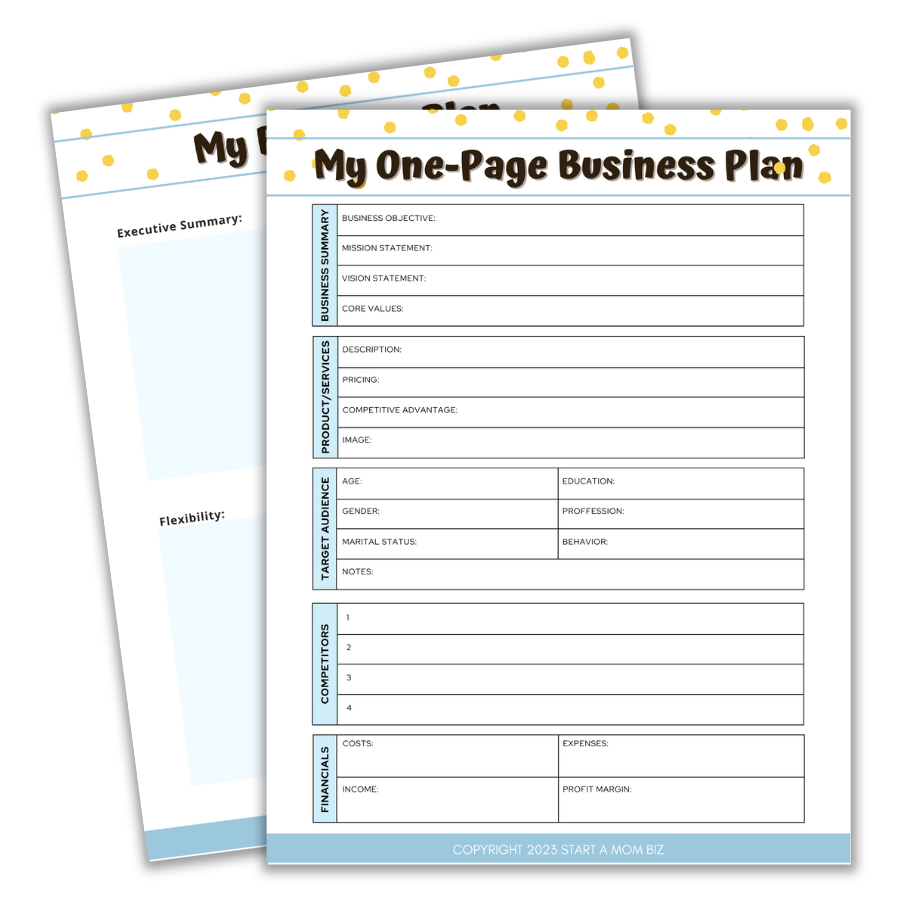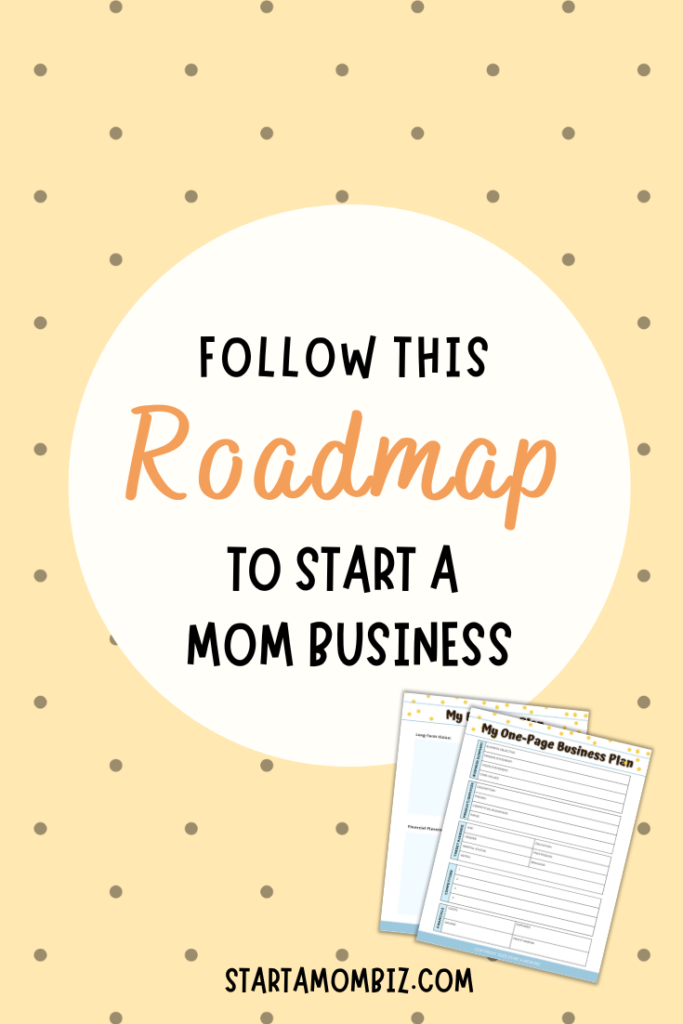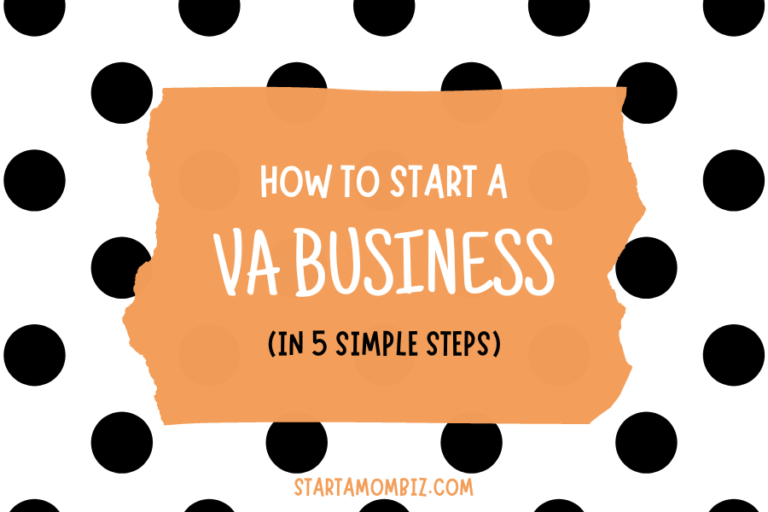Roadmap for How To Start a Mom Business This Year
If you’re a Christian mom who’s looking for a way to make some extra money, or if you’re dreaming of starting your own business, you’re in the right place! In this post, I’m going to share some tips on how to start a mom business that reflects your Christian values and earns extra income.

Hey there! If this is your first time here, then let me introduce myself. I’m a Christian mom of two teenagers. I’m also a stay-at-home mom, and have been since 2010! But I know that not everyone is in the same situation. Some moms have to work outside the home, and some are struggling to make ends meet.
I know what it’s like to be feeling overwhelmed and discouraged, especially when it comes to finances. I was there myself some years ago. We were living paycheck to paycheck, and I was working long hours at a job that I loved but didn’t allow me much time with my kids. I knew that I wanted to be home with them, but I didn’t know how to make that happen financially.
That’s when I decided to start my own home business. It wasn’t easy at first, but it was worth it. I was able to stay home with my kids, and I was able to make a good income doing something that I loved.
If you’re a Christian mom who is looking for a way to make some extra money, or if you’re dreaming of starting your own business, I’m here to help! I want to encourage you to go for it! It’s not easy, but it’s definitely possible. And it can be a great way to provide for your family and stay home with your kids. In this post, I’m going to share some tips on how to start a mom business that reflects your Christian values.
What is a mom business?
Before we dive into how to start a mom business, you need to understand what I mean when I use the term “mom business”.
A mom business is a business that is started and owned by a mom. Mom businesses can be of any type, but they often focus on products or services that are designed to make life easier for moms. For example, some mom business ideas might include selling organic baby food, providing childcare services, or offering online courses on parenting.
Want more ideas for a mom business? Here are 20 proven mom business ideas to help you start making money from home: 20 Side Hustles for Christian Moms
Mom businesses are becoming increasingly popular. In fact, a recent study found that there are now over 11 million mom-owned businesses in the United States. This growth is due in part to the fact that moms are increasingly looking for ways to work from home and have more flexibility in their schedules.
There are many benefits to starting a mom business. For one, it can be a great way to use your skills and talents to make a difference in the world. It can also be a great way to be your own boss and set your own hours. Additionally, mom businesses can be very rewarding financially. In fact, the average mom-owned business generates over $50,000 in revenue each year.
Starting a mom business can be a lot of work, but it can also be very rewarding. If you are willing to put in the effort, you can achieve your goals and build a successful business.
Benefits of Starting a Mom Business
So, why would someone choose to start a mom business while raising children? Here are some of the benefits of starting a home business as a mom:
- You can supplement the household income.
- You can be home with your children.
- You can set your own hours.
- You can work from anywhere.
- You can use your skills and passions to help others.
Can entrepreneurs be successful moms?
Some may be wondering, Can entrepreneurs be successful moms? In other words, is it possible for moms to run a home business and still be good moms?
Yes, entrepreneurs can be successful moms. In fact, many entrepreneurs find that motherhood helps them to be more successful in their businesses.
Here are some reasons why entrepreneurs can be successful moms:
- Entrepreneurs are used to juggling multiple tasks. As a mom, you are constantly juggling the needs of your children, your spouse, your job, and your household. This can be a great training ground for being an entrepreneur, as you will need to be able to juggle multiple tasks and priorities.
- Entrepreneurs are resourceful. As a mom, you are constantly coming up with creative solutions to problems. This is a valuable skill for entrepreneurs, as they will often need to find new and innovative ways to solve problems.
- Entrepreneurs are resilient. As a mom, you will face many challenges, both big and small. But you will also learn how to overcome these challenges and come out stronger on the other side. This resilience is essential for entrepreneurs, as they will face many challenges in their businesses.
Of course, being an entrepreneur and a mom can be challenging. But entrepreneurs can be successful moms. If you are a mom who is looking for a challenge and a way to make a difference in the world, then entrepreneurship may be the right path for you.
Here are some tips for successful entrepreneur moms:
- Set boundaries. It is important to set boundaries between your work life and your home life. This will help you avoid burnout and make sure you are able to give both your business and your family your full attention.
- Delegate. Don’t be afraid to delegate tasks to others. This will free up your time so you can focus on the most important things.
- Take care of yourself. It is important to take care of yourself physically and mentally. This means getting enough sleep, eating healthy, and exercising. It also means taking time for yourself to relax and de-stress.
- Find a support system. There are many resources available to help entrepreneur moms, including online forums, local meetups, and business coaches.
- Don’t be afraid to ask for help. There are many people who are willing to help entrepreneur moms succeed. Don’t be afraid to ask for help from your family, friends, and colleagues.
Remember, you are not alone. There are many other entrepreneur moms out there who are facing the same challenges you are. With hard work and dedication, you can achieve your goals and build a successful business.

Which business is best for a mother?
There are many businesses that are well-suited for mothers. Some of the most popular options include:
- Online businesses: Online businesses can be a great option for mothers because they can be run from home and offer a lot of flexibility. Some popular online businesses include e-commerce stores, blogging, and freelancing.
- Consultancy: If you have expertise in a particular field, you could start a consulting business. This is a great way to use your skills and experience to help others while also setting your own hours.
- Freelance work: Freelance work is another great option for mothers. You can find freelance work in a variety of fields, including writing, editing, graphic design, web development, and more.
- Blogging: Blogging is a great way to share your thoughts and experiences with others. You can also use your blog to promote your own products or services, or to generate leads for your consulting business.
- Social media marketing: Social media marketing is a great way to connect with potential customers and promote your business. You can use social media platforms like Facebook, Twitter, and Instagram to share content, run contests, and engage with followers.
These are just a few ideas. I made a list of 20 businesses that are best for a mother and how to get started in each in my free guide, 20 Side Hustles for Christian moms.
How to Start a Mom Business
Moms often ask the question, How do I become a mom entrepreneur? How can I balance between being a mom and starting a mom business? Can I really learn how to start a mom business?
It is possible.
Becoming a mom entrepreneur is an exciting and rewarding journey that allows you to combine your passion for motherhood with your entrepreneurial spirit. Here are 12 key steps to help you get started:
- Pray for direction.
- Look for God’s will in His word.
- Identify your gifts, skills, passion, and calling.
- Research your market.
- Find your ideal business.
- Create a business plan.
- Choose a business structure.
- Set up a home office.
- Get any necessary licenses and permits.
- Set up a website and social media accounts.
- Start marketing your business.
- Start offering services.
Let’s dive into each of these:
1. Pray for Direction
“This is the confidence we have in approaching God: that if we ask anything according to His will, He hears us.”—1 John 5:14
Prayer is simply opening up your heart to God as you would to a friend. Talk to God and tell Him your hopes, dreams, and wants. If anyone would know how to start a mom business, it’s God. So share with Him your fears, doubts, and frustrations. And then recite back to Him the promises you found in Step 1.
“Remind” God (though He NEVER forgets) what He promised in His word and tell Him your needs. Then believe He’s heard you and will work on your behalf.
Now, sit silently and allow God to communicate back to you. Journal what He impresses upon your heart. Stay prayerful throughout the day and be open to any changes He reveals regarding your goals.
2. Seek God’s Will in His Word
“A man’s heart plans his way, but the Lord directs his steps.” —Proverbs 16:9.
God’s Word holds the answer to every situation we face. We simply have to read it—study it—and apply its principles to our life.
Start by writing down your desires and goals. Next, search the Scriptures for verses and promises relating to these areas and write them down. Continue searching the Scriptures until you have written something for each desire on your list.
Once you have your list, you can now take it to God in prayer.
3. Identify Your Calling
The next step is to find a work-from-home idea that makes your heart sing. It should be something that aligns with your values, gifts, and passions, and that you can realistically commit to while still balancing your family’s needs.
For Christian moms, finding a business idea that aligns with their faith can also be important. Whether it’s selling handmade Christian crafts or providing virtual counseling services to other Christian moms, there are plenty of opportunities to integrate your faith into your business.
“Every good gift and every perfect gift is from above, coming down from the father…”—James 1:17
Questions to Discover Your Strengths, Skills, and Passions
As you try to find your ideal type of work-from-home, it’s important to identify the gifts, skills, and abilities you already possess. Here are some tips for identifying your skills and passions:
- Make a list of your skills. What are you good at? What do you enjoy doing? What are you passionate about?
- Think about your hobbies and interests. What do you like to do in your free time?
- What skills have you developed in your previous jobs or volunteer experiences?
- What problems do you see in the world that you want to solve?
- Ask your friends and family for their feedback. What do they think you are good at? What do they think you would be good at?
- Do some research. Look for online resources that can help you identify your skills and passions.
If you need a guide to discovering your gifts, my gifts assessment will guide you step-by-step in determining your gifts and the type of business that fits them best.
Knowing your God-given gifts and strengths helps you identify your calling. And discovering your calling allows you to live life with intention and focus.
Once you have identified your skills and passions, you can start brainstorming business ideas that align with them. Remember, the most important thing when thinking about how to start a mom business is to choose a business idea that you are passionate about. If you are passionate about your business, it will be easier to stay motivated and succeed.
4. Research the Market
Once you have identified your passions and skills, research the market to determine if there is a demand for your product or service. Look for gaps in the market that you can fill with your unique offerings.
This is also your opportunity to decide who you want to serve by defining your niche and avatar. Next, you will identify their needs, problems, pain points, and how you can help solve them (what qualifies you).
Here are some things to consider when researching the market:
- Who is your target audience? What are their needs and wants? What are their pain points?
- What are your competitors doing? What are their strengths and weaknesses? How can you differentiate yourself from your competitors?
- What is the size of the market? How much money is being spent on products or services like yours?
- What are the trends in the market? How is the market changing? How can you position your business to take advantage of these trends?
There are a few different ways to research the market. You can conduct surveys, talk to potential customers, and analyze market data. You can also use online resources, such as industry reports, trade publications, and online forums.
Once you have conducted your research, you will have a better understanding of the market and whether or not your business idea is viable. You will also have a better understanding of your target audience and how to reach them.
Who is your target audience?
Your target audience is the group of people who are most likely to buy your products or services. When you are researching the market, it is important to understand who your target audience is and what their needs and wants are.
There are a few different ways to identify your target audience. You can start by thinking about your own personal experiences and interests. List the things you are passionate about. What do you know a lot about? What problems do you see in the world that you want to solve?
Once you have a general idea of your target audience, you can start to narrow it down. You can do this by conducting surveys, talking to potential customers, and analyzing market data.
For example, if you are thinking about starting a business that sells handmade Christian jewelry, your target audience might be Christian women who are interested in fashion and accessories. You can learn more about your target audience by asking them questions about their age, location, income, interests, and needs.
What are your competitors doing?
Once you know who your target audience is, you need to research your competitors. Your competitors are the businesses that are selling similar products or services to yours.
When you are researching your competitors, you need to understand their strengths and weaknesses. You also need to understand how they are marketing their products or services.
By understanding your competitors, you will be able to identify opportunities to differentiate your business. For example, if your competitors are all selling handmade Christian jewelry online, you could differentiate your business by selling your jewelry at local craft fairs.
What is the size of the market?
The size of the market is the total amount of money that is being spent on products or services like yours. When you are researching the market, it is important to understand the size of the market.
There are a few different ways to estimate the size of the market. You can start by looking at industry reports and trade publications. You can also use online resources, such as Google Trends and Statista.
What are the trends in the market?
The market is constantly changing. It is important to understand the trends in the market so that you can position your business to take advantage of these trends.
There are a few different ways to identify trends in the market. You can start by reading industry reports and trade publications. You can also use online resources, such as Google Trends and Statista.
By understanding the trends in the market, you will be able to identify opportunities to grow your business. For example, if there is a trend towards online shopping, you could start selling your products or services online.
Here are some additional tips for researching the market:
- Use online resources. There are a number of online resources that can help you research the market. These resources include industry publications, trade shows, and online forums.
- Talk to potential customers. One of the best ways to understand the market is to talk to potential customers. You can do this by conducting surveys, holding focus groups, or simply talking to people in your target audience.
- Analyze market data. There is a wealth of market data available that can help you understand the market. This data can include sales figures, industry trends, and consumer behavior.
- Get professional help. If you need help researching the market, you can hire a market research firm. Market research firms can help you collect and analyze market data.
Researching the market is an important part of starting a home business. By taking the time to research the market, you can increase your chances of success.
5. Find your ideal business
After you have prayed for direction, looked for God’s will in His word, identified your gifts, skills, passion, and calling, and researched your market, finding your ideal business requires a combination of self-reflection and exploration. Here are some additional steps to help you in the process:
- Consider Your Lifestyle and Values: As a mom, it’s important to choose a business that aligns with your lifestyle and values. Consider the time commitment, flexibility, and work-life balance that each business idea offers. Reflect on what matters most to you and how your business can support and enhance your family life.
- Explore Your Options: Explore different business opportunities that resonate with your interests and align with your skills. Look for industries or niches where you can make a meaningful impact. Attend industry conferences, connect with other entrepreneurs, and seek inspiration from successful mom entrepreneurs who have built businesses in fields that interest you.
- Test Your Ideas: Once you have identified a few potential business ideas, test them out on a smaller scale. Start by offering your products or services to family and friends, or consider launching a pilot program. This will give you valuable feedback and insights into the viability and profitability of your ideas.
- Seek Guidance and Support: Reach out to mentors, business coaches, or fellow mom entrepreneurs who can offer guidance and support. Join online communities or local networking groups where you can connect with like-minded individuals who are on a similar journey. Their insights and experiences can provide valuable perspectives and help you make informed decisions.
- Trust Your Intuition: While gathering information and seeking advice is important, trust your intuition when making the final decision. Listen to that inner voice guiding you towards the business idea that truly resonates with your heart and aligns with your purpose. Trust that God will lead you to the right path as you step out in faith.
Remember, finding your ideal business is a process that requires patience and discernment. Stay open to possibilities, remain steadfast in prayer, and trust that God will reveal the perfect opportunity for you.

6. Create a Business Plan
A business plan is a roadmap for guiding you in how to start a mom business. It should include your business goals, strategies, and financial projections. A business plan will help you stay on track and make informed decisions about your business.
Here are some of the benefits of creating a business plan:
- Increased chances of success. Studies have shown that businesses with business plans are more likely to succeed than businesses without business plans.
- Better decision-making. A business plan can help you make better decisions about your business by providing you with a clear roadmap and by helping you to identify and assess risks.
- Attracting investors. If you are looking for investors, a business plan is an essential tool. Investors want to see that you have a clear plan for your business and that you are serious about your business.
- Obtaining funding. A business plan can help you obtain funding from banks, government agencies, and other sources.
- Attracting and retaining employees. A business plan can help you attract and retain employees by demonstrating your business’s viability and potential.
Tips for creating a business plan:
- Start with your business goals. What do you want to achieve with your business? Once you know your goals, you can start to develop strategies for achieving them.
- Do your research. Before you start writing your business plan, it is important to do your research and gather as much information as possible about your industry, your target market, and your competitors.
- Be realistic. When you are writing your business plan, it is important to be realistic about your goals and your resources. Don’t set yourself up for failure by setting unrealistic goals or by underestimating the amount of time and money it will take to achieve your goals.
- Get feedback. Once you have a draft of your business plan, it is a good idea to get feedback from others. This could include your mentors, your business partners, or your employees.
- Update your plan regularly. Your business plan is a living document. As your business grows and changes, you will need to update your business plan accordingly.
There are many different templates and resources available to help you create a business plan. You can find templates online or at your local library. You can also hire a business consultant to help you create your business plan.
What to include in your business plan:
- Executive Summary: This is a brief overview of your business, including your mission statement, products or services, target market, and competitive advantage.
- Company Description: This section provides more detail about your business, including its history, ownership structure, and management team.
- Products or Services: This section describes your products or services in detail, including their features, benefits, and pricing.
- Market Analysis: This section analyzes your target market, including their size, demographics, and needs.
- Competitive Analysis: This section analyzes your competitors, including their strengths, weaknesses, and strategies.
- Marketing Plan: This section outlines your plans for promoting and selling your products or services.
- Financial Projections: This section provides financial projections for your business, including revenue, expenses, and cash flow.
In addition to these general sections, a work-at-home mom may also want to include the following in her business plan:
- Work-Life Balance: Discuss how you plan to balance your work and home life. This may include setting specific work hours, working from a dedicated space in your home, or hiring help with childcare.
- Flexibility: Highlight the flexibility that a home business can offer. This may include the ability to work from anywhere, set your own hours, or take breaks when needed.
- Support: Discuss the resources and support that are available to work-at-home moms. This may include online communities, government programs, or business incubators.
Creating a business plan is an important step in starting a home business. By taking the time to create a well-written business plan, you can increase your chances of success.
Get your business plan template and guide to creating your business plan in the 20 Side Hustles for Christian Moms Workbook.
7. Choose a Business Structure
When you start a mom business, you need to choose a business structure. The type of business structure you choose will affect your taxes, liability, and business expenses.
There are four main types of business structures:
- Sole proprietorship: A sole proprietorship is a business owned by one person. The owner is personally liable for the debts and obligations of the business.
- Partnership: A partnership is a business owned by two or more people. The partners are personally liable for the debts and obligations of the business.
- Limited liability company (LLC): An LLC is a business that offers limited liability to its owners. This means that the owners are not personally liable for the debts and obligations of the business, up to the amount of their investment in the LLC.
- Corporation: A corporation is a business that is a separate legal entity from its owners. This means that the owners are not personally liable for the debts and obligations of the business.
The best type of business structure for you will depend on your individual circumstances. If you are starting a small business, a sole proprietorship or partnership may be a good option. If you are starting a larger business, or if you want to limit your personal liability, an LLC or corporation may be a better option.
Here are some things to consider when choosing a business structure:
- Taxes: The type of business structure you choose will affect your taxes. For example, sole proprietorships and partnerships are pass-through entities, which means that the income and losses of the business are passed through to the owners and taxed on their personal tax returns. Corporations are taxed separately from their owners.
- Liability: The type of business structure you choose will affect your liability. For example, sole proprietors and partners are personally liable for the debts and obligations of the business. LLC members and corporate shareholders are not personally liable for the debts and obligations of the business, up to the amount of their investment.
- Business expenses: The type of business structure you choose may affect your business expenses. For example, sole proprietorships and partnerships may be able to deduct business expenses on their personal tax returns. Corporations may be able to deduct business expenses on their corporate tax returns.
If you are unsure about which business structure is right for you, you should consult with an attorney or accountant.
8. Set Up a Home Office
If you’re going to be working from home, it’s important to set up a dedicated home office. This will help you stay focused and productive.
When setting up your home office, make sure to:
- Choose a quiet space where you won’t be interrupted. This could be a spare bedroom, a corner of your living room, or even a closet. If you have young children, consider setting up your home office in a room that you can close the door to.
- Invest in a comfortable chair and desk. You’ll be spending a lot of time in your home office, so it’s important to have a comfortable place to sit and work. A good desk will give you enough space to spread out your work, and a comfortable chair will help you avoid back pain.
- Get a good computer and printer. You’ll need a computer to do your work, and a printer will come in handy for printing out documents, reports, and presentations.
- Organize your paperwork and supplies. A cluttered workspace can be distracting, so it’s important to keep your paperwork and supplies organized. You can use file folders, binders, and drawers to keep your things in order.

Here are some additional tips for setting up a home office:
- Make sure your home office is well-lit. Good lighting will help you see your work and avoid eye strain.
- Add some personal touches to your home office. This will help you feel more comfortable and productive in your space.
- Take breaks throughout the day. It’s important to get up and move around every 20-30 minutes to avoid getting stiff and sore.
By following these tips, you can set up a home office that is both comfortable and productive.
9. Get Any Necessary Licenses and Permits
Depending on the type of business you’re starting, you may need to obtain certain licenses and permits. Check with your local government to find out what’s required.
Here are some examples of licenses and permits that you may need:
- Business license: A business license is required for most businesses. You can usually obtain a business license from your city or county government.
- Sales tax permit: If you sell products or services, you may need to obtain a sales tax permit. You can usually obtain a sales tax permit from your state government.
- Occupational license: An occupational license is required for certain businesses, such as childcare providers, contractors, and real estate agents. You can usually obtain an occupational license from your state government.
It’s important to note that the requirements for licenses and permits vary from state to state and city to city. Be sure to check with your local government to find out what’s required for your specific business.
10. Set Up a Website and Social Media Accounts
In today’s digital world, it’s more important than ever for Christian mompreneurs to have an online presence. A professional website and engaging social media accounts can help you connect with other moms, share your faith, and build a community.
Setting up a website
If you don’t have a website yet, now is the time to get one. A website is a great way to showcase your work, share your story, and connect with potential customers. There are many different ways to create a website, but the easiest option is to use a website builder. Website builders are user-friendly and affordable, and they can help you create a professional-looking website without any coding experience.
Creating social media accounts
In addition to a website, you should also create social media accounts for your business. The most popular social media platforms for Christian moms include Facebook, Instagram, and Pinterest. When creating social media accounts, be sure to choose a name that is relevant to your business and that is easy for people to remember. You should also create a profile picture and cover photo that reflect your brand.
Branding
Your brand is what makes you unique. It’s the way you present yourself to the world, and it’s what will make people remember you. When branding your business, be sure to focus on your unique selling proposition (USP). What makes your business different from the competition? What can you offer that no one else can?
Content creation
Once you have a website and social media accounts, you need to start creating content. Content is what will keep people coming back to your website and social media pages. When creating content, be sure to focus on quality over quantity. It’s better to create a few high-quality pieces of content than a lot of low-quality content.
Utilizing social media platforms
Each social media platform has its own unique features and benefits. To reach your target audience, you need to be strategic about which platforms you use. For example, if you’re targeting moms who are interested in homeschooling, you might want to focus on Facebook groups. If you’re targeting moms who are interested in natural living, you might want to focus on Pinterest.
By following these tips, you can set up a professional website and create engaging social media accounts that will help you connect with other Christian moms and build a successful business.
11. Market Your Business
Once you have your website and social media accounts set up, it’s time to start marketing your business. There are many ways to market your business, such as:
- Pay-per-click advertising: Pay-per-click advertising is a type of online advertising where you pay each time someone clicks on your ad.
- Search engine optimization (SEO): SEO is the process of improving the ranking of your website in search engine results pages (SERPs).
- Social media marketing: Social media marketing is the use of social media platforms to promote your business.
- Email marketing: Email marketing is the process of sending email messages to a list of subscribers.
The best way to market your business will depend on your target audience and your budget. Be sure to experiment with different marketing strategies to find what works best for your business.
Here are some additional tips for marketing your business as a Christian mom:
- Be authentic and transparent. Let your customers know that you are a Christian mom who is passionate about your business. Share your story and your values, and let your customers know that they can trust you.
- Use social media to connect with other Christian moms. There are many online communities for Christian moms, and these can be a great way to connect with potential customers and build relationships.
- Get involved in your community. Volunteer your time at local Christian organizations, and get involved in your church. This is a great way to meet new people and spread the word about your business.
Starting a home business can be a great way for Christian moms to stay home with their children and earn a living. However, it’s important to remember that it takes hard work and dedication to succeed. By following these tips, you can increase your chances of success and build a thriving home business.
Work With a Virtual Assistant
If you’re feeling overwhelmed, you may want to consider working with a virtual assistant. A virtual assistant can help you with tasks such as bookkeeping, customer service, and marketing. This can free up your time so you can focus on growing your business.
There are many virtual assistant services available online. When choosing a virtual assistant, be sure to find someone who is reliable, trustworthy, and has the skills and experience to help you with your business.
12. Start offering services
Once you’ve done all of the hard work, it’s time to start offering your products or services to the world. Be confident in your abilities and offer your services with a smile.
Here are some tips for offering your services as a Christian mom:
- Be clear about your target audience. Who are you trying to reach with your services? Once you know your target audience, you can tailor your marketing and sales efforts accordingly.
- Set realistic expectations. It takes time to build a successful business. Don’t expect to become an overnight success. Be patient and persistent, and you will eventually achieve your goals.
- Be prepared to work hard. Starting a business is a lot of work. Be prepared to put in long hours and make sacrifices. But if you’re passionate about your business, the hard work will be worth it.
- Set aside specific times each day for work. This will help you stay on track and avoid distractions.
- Take breaks throughout the day. Get up and move around, or step outside for some fresh air. This will help you stay refreshed and focused.
- Don’t be afraid to ask for help. If you’re feeling overwhelmed, don’t be afraid to ask your family, friends, or a professional for help.
Starting a home business can be a great way for Christian moms to balance their work and family responsibilities. By following these tips, you can increase your chances of success.
Let’s Wrap it All Up…
Starting a home business can be a great way for Christian moms to provide for their families and stay home with their children. It’s not easy, but it’s definitely possible. If you have a dream of starting a mom business, don’t give up. With hard work and dedication, you can achieve anything.
Here are some final tips on how to start a mom business:
- Pray for guidance and wisdom. Ask God to lead you in the right direction and to give you the strength and perseverance you need to succeed.
- Be organized and efficient. Time management is essential when you’re working from home. Create a schedule and stick to it as much as possible.
- Set boundaries. It’s important to set boundaries between your work time and your family time. This will help you avoid burnout and ensure that you’re able to spend quality time with your children.
- Find a support system. There are many online and offline communities for Christian work-from-home moms. These communities can provide support, encouragement, and advice.
Starting a home business can be a challenging but rewarding experience. If you’re a Christian mom who is looking for a way to provide for your family and stay home with your children, starting a home business may be the right choice for you.
Pin for later:






